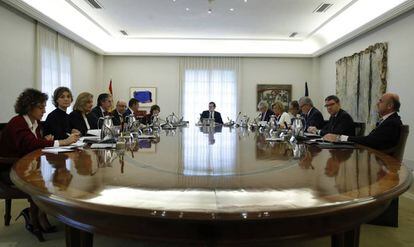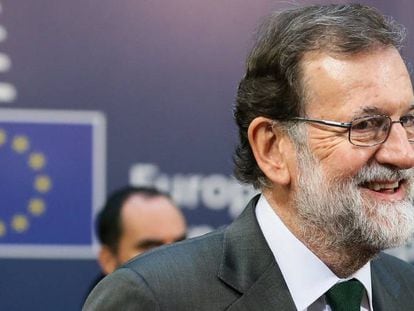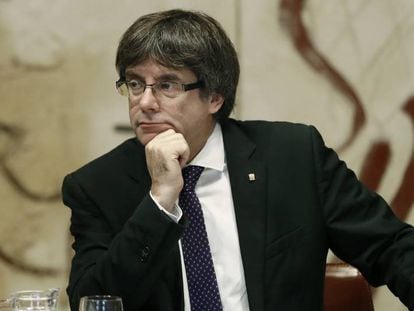Spanish PM activates Article 155, stripping powers of Catalan government
Mariano Rajoy says that he will call elections in Catalonia “as soon as institutional normality” returns. Regional premier Carles Puigdemont will be removed from his position

In a news conference following a two-hour Cabinet meeting on Saturday, Spanish Prime Minister Mariano Rajoy announced that Catalan premier Carles Puigdemont, his deputy and all the members of the Catalan government will be removed as part of emergency measures to restore the law in the breakaway region.
He also said that elections will be held in Catalonia as soon as possible within the next six months. “It is my wish to call elections as soon as normality is restored,” said Rajoy.
Both these measures are a result of invoking Article 155 of the Spanish Constitution, an obscure provision allowing the central government to take direct control of a region’s affairs if the latter is in breach of the law.
This is the first time since the Constitution was ratified in 1978 that such powers have been invoked, and Rajoy said he had done everything possible to prevent this situation, but that he is now forced to act.
“There is no country in the world ready to allow this kind of situation within its borders,” said Rajoy, in reply to a question about whether he fears a backlash of pro-independence sentiment when the measures are rolled out.
The measures will not be implemented yet, as they still require approval by the Spanish Senate next week, Rajoy said.
The measures were drafted with support from the Socialist Party (PSOE) and Ciudadanos, Rajoy added.
Rajoy said that the decision to apply Article 155 is aimed at: restoring adherence to the law in the region; for elections to be held with normality; ensure institutional neutrality; maintain social wellbeing and economic growth; and ensuring that the rights and freedoms of all Catalans are respected.
“The autonomy of Catalonia is not being suspended,” he continued. “The people who have put it in risk are being suspended.
“The government had many chances before to apply Article 155,” he continued, “but we preferred to act with prudence, responsibility and common sense, trying to bring about a change of course. Things could not have been done worse than they have been done by the Generalitat in Catalonia in recent times.
“It was not our wish nor our intention to apply Article 155,” he told the press. “We are doing so because no government, of any democratic country, can accept for the law to be ignored, for the law to be violated, for the law to be changed and for all of this to be done with the intention of imposing their criteria on everyone else.”
He added: “These measures have been agreed with the PSOE and Ciudadanos. I thank them for their support, which I don’t interpret as support for the government, but rather support for the rule of law.”
The activation of Article 155 of the Constitution has only one precedent in the history of Spanish democracy: in 1989, when the government of Felipe González threatened to use it in the Canary Islands, but he managed to stop the fiscal rebellion of the regional government before taking the matter to the Senate.
The current process in the Senate will take a week to pass, which will give one last window of opportunity for the institutional conflict between Madrid and the Catalan regional government to be resolved without the latter’s powers being suspended.
The PP, PSOE and Ciudadanos all believe that calling early elections would be the best response by Puigdemont to the rising political, institutional and social tension in Catalonia. But the regional premier has so far rejected that option, and is instead threatening to declare independence unilaterally in the Catalan parliament.
What’s more, Rajoy today stressed that only the Senate can now stop the application of Article 155. As such, the countdown has begun: the measures mediated by the Cabinet to take over the powers of the Generalitat will go into full force in less than a week.
English version by Simon Hunter and Susana Urra.
Control of public broadcasters
The possible application of Article 155 in Catalonia next week will have immediate consequences in the regional interior department, starting with the removal of its chief, Joaquim Forn, from his position. The Spanish Interior Ministry will take control of the regional police department, the Mossos d’Esquadra, and will prepare to relieve from his post its current chief, Josep Lluís Trapero, who is currently being investigated by the Spanish High Court for sedition.
What’s more, the Civil Guard will assume control of the region’s Telecommunications and Information Technology Center (CTTI), a move considered to be the key to stopping the creation of parallel state structures by pro-independence forces.
Sources consulted by EL PAÍS have suggested that the general director of the Mossos, Pere Soler, will also have to leave his role. Soler appears in Civil Guard recordings giving instructions to the Mossos to protect some of the key figures behind the October 1 illegal referendum. The government could also take control of the regional public broadcaster in Catalonia in order to guarantee the transmission of “verified, objective and balanced information.”












































